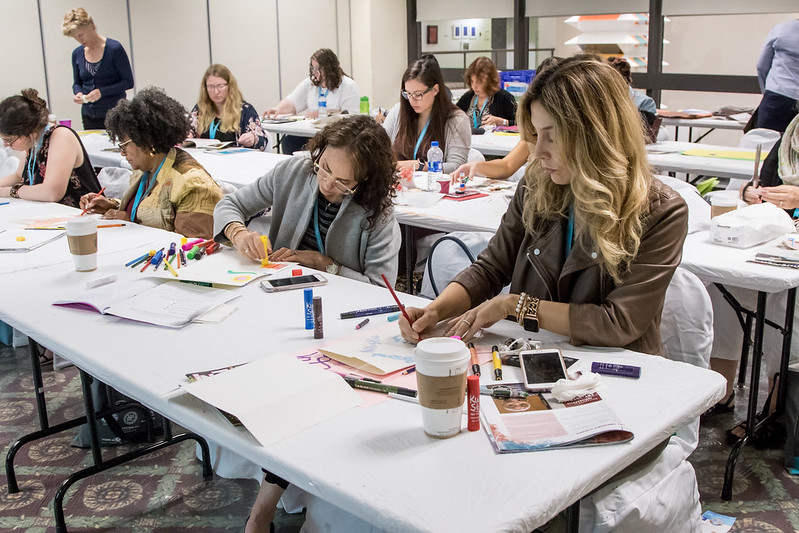June 23, 2023
This year’s Annual Conference program features five days of curated experiences at San Diego’s Town and Country Resort, including sessions in all 19 program tracks, from activism and addiction, to technology and trauma. By attending all five days of the conference, you can earn up to 24 CEUs from a selection of 140+ sessions!
Check out some sessions and register now before they fill up.

All Day Advanced Practice Course | ES39 | Neuroscience-Trauma Informed Art Models: A creative art therapy tool in practice
Erin Rafferty-Bugher, Kasi Misseldine, Natasha Green, Amzie Reeves
This all day advanced practice course will explore the benefits of including neuroscience-informed trauma concepts in art therapy training and practice. Relevant concepts on brain-body mechanisms and functionality will be integrated via creative synthesis. Participants will view examples of neuroscience-informed trauma art projects, cultivating creativity and compassion by developing a model/ prototype for professional practice.
All Day Advanced Practice Course | TR116 | Treating Trauma Using the Body Narrative: A Compassionate Art Based, Storied Intervention
Paula Howie, Hugh K. Marr
This all day advanced practice course will present a unique intervention designed by the trainers after decades of treating clients with trauma. Integrating body focus, narrative, and personal story, this training will give experienced clinicians insight into co-changing life and trauma narratives. It will include clinical examples experiential exercises, and discussion.
Workshop | SC79 | Art and Om: An Embodied Exploration Into Creativity, Curiosity and Compassion
Eden Orfanos Shoro, Anastasia Titova, Nathalie Robelot-Timtchenko, Anna Kegeles, Wendy Bradley
The Art and Om workshop merges the methodologies of Art Psychotherapy, Trauma Informed Expressive Arts and Trauma Sensitive Yoga. This didactic experiential and psycho-educational workshop will demonstrate the combined benefits of integrative art therapy and Yogic practice, through a neurobiological lens to promote creativity, curiosity and compassion.
Workshop | PP157 | Inspiration from Within: A Strengths-Based Approach to Clinical Supervision
Elizabeth Gardner-Hill
Participants will engage in artmaking to explore their current supervisor/supervisee relationships. They will learn strategies for effective supervision utilizing a strengths-based approach, and they will learn tools to help enhance their supervision skills by utilizing their strengths and those of their team members.
Panel | PP21 | Lessons Learned: Expanding Art Therapy Practice to Publication
Heather J. Denning, Janet Kempf, Jennifer Schwartz, Molly O’Neill Haaga
Panelists will present their paths from art therapy practice to publication and provide practical steps to move through the writing process. The panelists collaborated on recent publications fostering both individual and collective professional development. Attendees will explore and discuss their interests in scholarly activities and possibilities for future publications.
Panel | TE184 | Preserving Our Humanity and Creativity in the Age of AI
Nancy Sunjin Choe, Natalie Carlton
Highly sophisticated and accessible AI applications offer new opportunities as well as ethical, social, and educational challenges in the field of arts and health. What are the guidelines and implications to human creativity and therapeutic services as we adopt AI tools in mental health practice and education?
Paper | ET15 | Becoming Curious about Creativity: Defining Creative Experiences in Art Therapy
Lisa Hinz
Creativity is a natural resource, basic human right, and healing aspect of therapy. Many people, including art therapists, struggle to describe themselves as creative. This presentation will help broaden and deepen the definition of creativity in therapy and help therapists explore how greater creative confidence can increase therapeutic efficacy.
Paper | RE153 | Problem-Solving in the “Person Picking an Apple from a Tree”
Linda Gantt
Problem-solving is a unique feature of the PPAT (“person picking an apple from a tree”). When measured using the FEATS, four different diagnostic groups and a control group are distinguished from each other. Two pilot studies are presented: adolescents in a psychiatric hospital and trauma survivors in an outpatient program.
